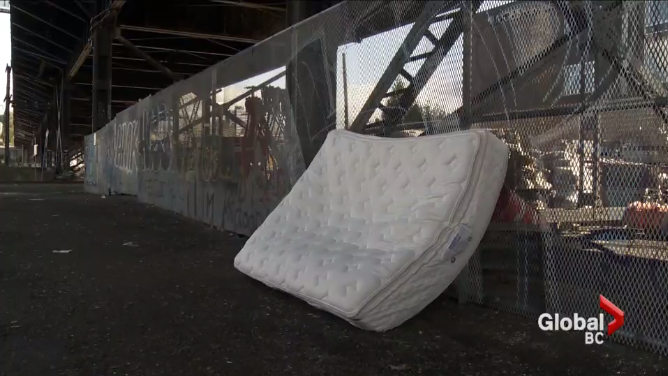The CKNW and Global News Neighbourhood Series is an annual series that explores neighbourhoods in Vancouver, Surrey, and the Tri-Cities. CKNW’s Niki Reitmayer takes a look at Downtown Vancouver’s mounting trash problem.

LISTEN: Neighbourhood Series – Downtown Vancouver
Standing on the corner of Georgia and Granville Streets, it’s not hard to find trash.
Napkins from nearby food vendors blow past like tumbleweeds, disposable coffee cups lay strewn around bins, cigarette butts, discarded SkyTrain tickets — it’s everywhere.
Does the City of Vancouver have a garbage problem?
In 2016, the city said garbage abandoned on the streets was costing taxpayers about $1 million a year.
“What I’ve seen personally in the last little while is people seem to be paying less attention to where the litter cans are, and I’m finding more stuff just in general on the street,” admits Albert Shamess, the city’s director of waste management and resource recovery.
Shamess said the city is now in the process of launching an anti-littering campaign on social media and in venues to try and educate the public about littering.
March 2016: Vancouver’s illegal dumping problem grows

But it’s not just people carelessly ditching their coffee cups. The city is grappling with a larger problem, Shamess said.

Get daily National news
“We’ve seen an increase in different types of litter around the city in the last year, particularly things associated with drug use and homelessness and it’s been a real challenge for us.”
That problem is especially evident in some areas of the downtown core, such as Granville Street, where Shamess said the city directs extra attention.
So what can the city do to clean up the streets while staying sensitive when dealing with this social issue?
“We put out additional bins to try and accommodate more material, we increase our collection frequency, and try and manage it that way. We also participate with other agencies involved.”
WATCH: Illegal dumping is costing Metro Vancouver communities millions of dollars

Street trash is one half of the problem; illegal dumping is the other.
Offenders who dump in the downtown core can be fined between $100 and $10,000.
Even so, downtown residents know that finding mattresses and other large garbage items in alleys isn’t an unusual sight. In fact, the city collected 6,450 dumped mattresses in 2015 alone.
To prevent illegal dumping, the city suggests that residents and building managers store waste containers in a location that’s not visible from the street or lane.
It also recommends dumpsters and trash bins be locked up, and even suggests installing security cameras.
Downtown residents are lucky to have a view of the mountains, the ocean, and a beautiful city skyline. But unfortunately, garbage and litter has become a part of that landscape as well.
According to Shammess, it’s a problem that can only be fixed if everyone helps out.
“We have increased our service here for the last two to three years. At some point, were not going be able to do this anymore. It just gets too expensive and, you know, we need the support of the residents within the city to look after the city, take some pride in the city, and not just walk by if you see litter,” Shamess said.
“If you see something, pick it up and put it in the can.”












Comments